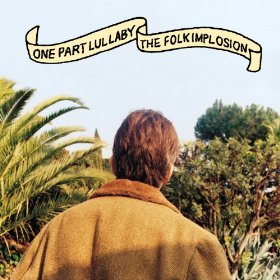22
Jan 13
The Folk Implosion: “Free to Go”

As if not being able to get a song on the album wasn’t bad enough, Davis couldn’t even get his face on the cover.
It would be with only a slight hint of hyperbole that I might say this: Lou Barlow is perhaps the greatest, purest, indie songwriter. Ever. But in a sense it may indeed be true (with the allowance that such a statement is, of course, primarily a matter of opinion): his talent for writing an introspective lyric and then putting it to a catchy, yet simultaneously moving, melody is nearly without equal. (Beck is another who is in this league, albeit utilizing more of a sense of humor than Barlow.) Barlow has proven it time and again with Sebadoh, on his own (under his own name and as “Sentridoh”), and with the Folk Implosion, his duo with John Davis. Combine that with his volume of output, consistently great with few weak spots, and you’ve got a pretty great body of supporting evidence for such a statement. His overarching lo-fi recording aesthetic merely underscores it all, showing that he doesn’t require fancy studio gimmickry for the songs to be great. Even on little more than a 4-track home recorder, his songs shine through.
Today’s song selection, “Free to Go,” was released in 1999 on the Folk Implosion album, One Part Lullaby. It encapsulates everything great about Barlow and his songs: deep introspection expressed succinctly, sung in Barlow’s smooth yet emotive voice, and set to a very catchy melody. “Free to Go” — along with much of One Part Lullaby — is on the higher end of Barlow’s production spectrum, and features a trip-hop-style rhythm that never fails to also sound organic (even when that includes the use of “cookie sheet” as an instrument). Lou is never one to rely too greatly on electronic instruments, although he certainly knows how to incorporate them to best effect when he wants to. Of course, the presence of John Davis shouldn’t be ignored, but the album feels and sounds primarily like a solo Barlow project — Davis seems mostly there as an additional musician.
“Free to Go” seems to be a sad look back at a childhood in which Lou (or at least his persona in the song) felt confusion over his parents’ breakup, and his subsequent feelings of abandonment:
Trapped in the back seat — stay on your side
My hand out the window feeling the wind rush by
While my parents fightWhere did you go? Did I make you leave?
Another thing I didn’t know
Nobody ever believes. They just leave, they just leave.
And they’ll see you on their own sweet time,
They just leave.
Only to come to the conclusion over the course of the song that that’s just what people do . . . they just leave. An equally sad determination, of course, but as usual it’s coated in the sweetness of Barlow’s melody. As is often the case with his songs, it’s not until you’ve already been lured in by the appealing sound or pretty melody that the sadder/darker side of the lyrics sinks in. But much of Barlow’s introspective observation rings true, or at least “true” in the sense that these are things that many of us have found ourselves contemplating at one time or another, so that discovery is never a deal breaker — in fact it usually serves to enhance the depth of attachment to the song. It’s all part of Barlow’s genius.
(See also Lou’s unlikely but great cover of Ratt’s “Round ‘n’ Round”…)



Comments, please…